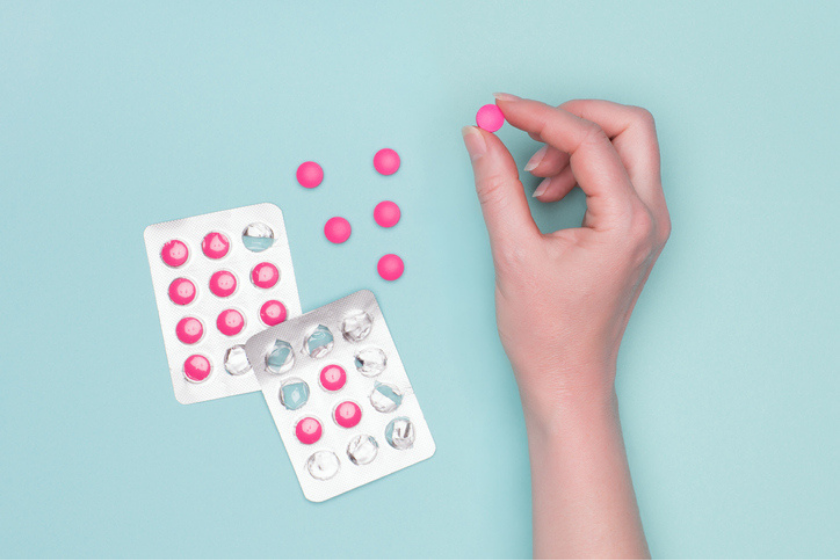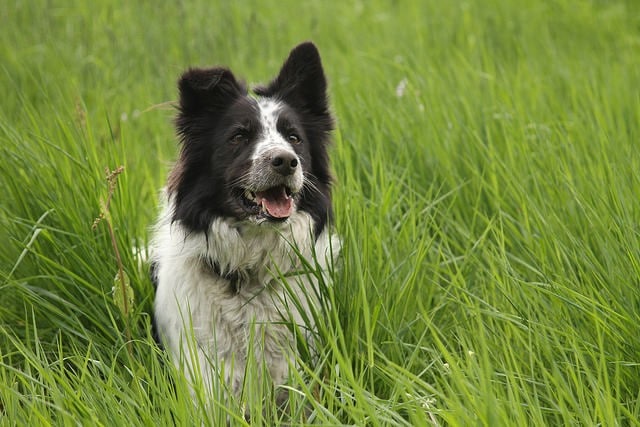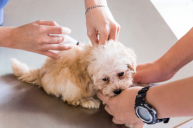Can you fix dog allergies with liquid Benadryl? Like humans, the answer is yes, but it's important to make sure your pup receives the right dose. Most human medications aren't safe for pets, or the dosages involved are completely wrong for your pooch. Still, for mild allergies it's hard to justify a trip to the vet. Benadryl can help relieve seasonal allergies in dogs when given at the correct dose. Getting the dose correct, however, is crucial, as with any medication. This is a great medication to have in your cabinet for allergy season, whether it's you or your canine companion suffering.
Benadryl might seem like a cure-all, but this drug is just a temporary fix for mild allergies. If your dog has an ongoing reaction or skin irritation, you should make an appointment with your veterinarian. A severe reaction warrants a trip to the emergency vet clinic regardless of what home care your pup receives before heading there.
How Benadryl Is Used For Dogs

Benadryl, also known by its common name diphenhydramine, is an antihistamine, which blocks h-1 receptors in the bloodstream, calming allergic reactions. Some alternatives to the drug are other brand names like Zyrtec and Claritin; both use cetirizine, and they are also safe for your pup.
Symptoms of allergies like skin conditions, food allergies, and environmental allergies are itchiness, sensitivity, sneezing, or a runny nose. These can sometimes be treated short-term with Benadryl. Inflammation or swelling caused by bee stings, for example, is another use for Benadryl in dogs.
While Benadryl overdose in people typically results in drowsiness and muscle spasms, it can be toxic in dogs. Adverse side effects in dogs from too much Benadryl include vomiting or nausea and a rapid heartbeat. Too much Benadryl can overwhelm their nervous systems and can be fatal. Watch out for symptoms of an overdose in your pup by looking for:
- Constipation
- Dilated pupils
- Agitation
- Seizures
- Rapid heart rate
If your dog is ever sick from car rides, you can also proactively try Benadryl as it may help with motion sickness. Dog owners should always consult their vet about using anything over the counter, even if it's being used proactively for motion sickness.
While not recommended for humans, Benadryl can be helpful for your pup for mild sedation in stressful situations such as fireworks displays and thunderstorms, where your pup may become highly anxious. Since the antihistamine does induce sleepiness, it can have a calming effect on your pup. If you would rather use something more natural instead of a Benadryl dog dose, you can always other alternatives.
It can also be used with heartworm treatment to ensure that your pet does not have an allergic reaction to the medication.
Benadryl Dosage for Dogs by Weight

The standard Benadryl dosage for dogs is one milligram per pound of body weight, which can be given 2-3 times each day. As an example, a 50-pound Siberian Husky could receive 50 milligrams of Benadryl per dose up to three times a day.
It's also recommended to never use liquid or time-release tablets, as these forms will not break down the same in a dog's stomach as they would a human's stomach. Your safest bet is to stick with tablets. Available over-the-counter, most Benadryl tablets are 25 mg each, but it is essential to always check the label, which you should be doing with your own medications anyway. It is crucial to follow the correct dosage not to overdose your pup, and, of course, double-check with your vet if you are unsure about how much Benadryl is safe for your dog.
Practical Dose Application

My dog Sherman was stung by a bee (or what we think was a bee) when he was digging a hole in the backyard. I dosed Benadryl proactively before I saw any signs of inflammation where the insect bite occurred. I also give my dog Benadryl if he has any itchy hot spots pop up on his skin after coming out of the lake. Sometimes, he gets little hot spots even after getting a bath, and the Benadryl soothes it.
I made sure to watch for dry mouth, difficulty breathing, rapid breathing, hyper-excitability, urinary retention, or drowsiness, which are all common side effects of Benadryl. It's better to be safe than sorry but always essential to make sure the Benadryl dog dose works well with your dog. You'll want to be acutely aware of any side effects or adverse reactions after dosing.
To make the tablets easier to ingest, have a few pill pocket treatson hand, or simply wrap the dosage inside your pet's snack of choice.
Staff note: Vets have been known to prescribe Benadryl for other health conditions besides allergies and motion sickness in dogs. In fact, it has been used to treat dogs with mast cell tumors.
Safety Issues and Cautions

Allergic reactions can be dangerous, so use your best judgment to determine if the dog's symptoms warrant emergency care. It is always best to check with your pet's veterinarian before administering the over-the-counter medication, especially if the animal has a medical history or is taking any other medications. Your vet may also need to administer your Benadryl dog dose under the skin with an injection that will work quicker than an oral dose, so follow up with them either way, especially if it's an emergency.
If your dog has any medical conditions, you should not give them Benadryl because it can cause an adverse reaction. Medical conditions that do not interact well with Benadryl are:
- Lung Disease
- High Blood Pressure
- Cardiovascular Disease
- Glaucoma
- Enlarged Prostate
- Bladder Issues
Of course, for optimal dog health, do not give them Benadryl if they have had an allergic reaction to it before. Some dog breeds naturally are predisposed to allergic reactions, and they are more likely to have a problem with Benadryl. Some breeds to watch are:
- Labrador Retrievers
- Shih Tzu
- German Shepherd
- Pug
- Boxer
- Cocker Spaniel
- Bull Terrier
- Poodle
- Dalmation
Many popular dog breeds can have allergies, so make sure you check with your dog's vet if you have concerns about how much Benadryl is safe for your dog based on their breed or age.
This article was originally published on September 18, 2019.




